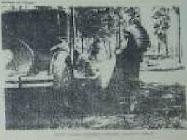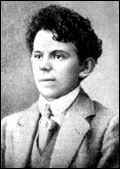"Providence" has a futuristic ring to it, in a theological sense. It signals a Plan, a "divine economy" at work, somehow... a thought that easily leads us sleepy sheepies astray. Into by-ways of fanaticism or complacency or quietism (quietism is a great danger to anyone spending a lot of time in a library).
The NY Times op-ed writer Ross Douthat posted an interesting column recently, sketching out some Babel-divides in the U.S. over beliefs & worldviews. He suggests there are three main groups of thought : 1) believers in Biblical religion, all of whom ascribe, on a variable scale, some literal & historical actuality to the scriptures; 2) "spiritual" people, who trust in some over-arching spiritual meaning in experience, but who are not doctrinaire or especially focused on the rational grounds of same; 3) secular rationalists, people who do not believe in God or the promises of religion, but who are liberal idealists grounded in the humane reason of the Enlightenment. Douthat presents his own opinions on the viability of each of these standpoints, & then closes with this passage :
"The cracks are visible, in philosophy and science
alike. But the alternative is not. One can imagine possibilities: a
deist revival or a pantheist turn, a new respect for biblical religion, a
rebirth of the 20th century’s utopianism and will-to-power cruelty.
"But for now, though a few intellectuals scan the heavens, they have yet to find their star."
Their star. It's been pointed out in various contexts that the Christmas holiday has morphed a lot over the centuries; that the celebration of Jesus's birthday was less important to the first Christians than the Easter time, & that the commercial/Santa-Claus family holiday we celebrate owes a lot to ancient pagan seasonal get-togethers. All true. But I guess to my mind our version of Christmas merges with the Epiphany holiday of early January (which is celebrated as Christmas, I think, in the Eastern Orthodox churches). After all the nativity scene in the manger has its source in the Gospel story of the visit of the Magi, the three wise men from the East, who followed the "star" (perhaps an astrological symbol) to find the divine King... ie. this is the story of Epiphany. All those Christmas creches and mangers stem from this story.
Epiphany... I believe the word originates in the Greek for "light". Illumination. The wonder of a discovery. The Magi follow the star to find... the one about whom the Gospel of John states, "in Him was light, and the light was the light of men."
I had a delightful conversation at a neighborhood holiday party last weekend, with a young Brown professor (from India) who told me she was involved in a joint Brown/RISD project to develop a symposium/exhibit next year on the circus. It sounds like a terrific idea. Her own area of expertise happens to be the theme of animals in modern French/European literature. I mentioned a New Yorker article from a few years back by William Dalrymple - I think it was called "Homer in India" - about contemporary Indian practitioners of archaic oral epic poetry. I was reminded of a passage in that essay where Dalrymple talks about the special bond between humans and animals in the "shepherd" communities which maintained this kind of traditional poetry.
Anyway, it didn't occur to me at the time, but that little chat now seems sort of appropriate for the holiday season, with the stable & the manger & the sheep & the cows & the "shepherds keeping their watch by night".
Poets have a professional bent toward metaphors, metamorphosis. How a poem climbs up the "stairway of surprise" (Emerson's image). So maybe we can develop an affinity for epiphany. This is somewhat how I understand matters of theology & religion in general. It's about metanoia - a "change of mind." St. Paul talks about the main aim of discipleship (it's a discipline) as a "renewal of your mind". Renewal through focus - training the eye toward God in all things. Of course, in the end, it's about more than that, even : it's about a complete re-orientation of the whole person, a true and radical change of heart. But it begins with epiphany - with a light turned on.
Nothing changes, seemingly, in the round of things. The same stupid stuff happens. There are no wonders in the sky or sea. Yet we experience a change of heart... our eyes open. In some mysterious fashion, our hard hearts of stone are softened into warm hearts of flesh. Scrooge weeps & changes his ways. We see our own ordinary lives in a completely new light.
Nothing changes, seemingly, in the round of things. The same stupid stuff happens. There are no wonders in the sky or sea. Yet we experience a change of heart... our eyes open. In some mysterious fashion, our hard hearts of stone are softened into warm hearts of flesh. Scrooge weeps & changes his ways. We see our own ordinary lives in a completely new light.
The star... the star in the manger... among the animals. What I see here is a symbol, a metaphor, for the wholeness of the human image. I mean an image of global humanity assuming our whole dignity - our wholeness - among the domesticated animals. Because outside the manger lurk the wilder beasts : the "ravening wolf", for example. The wolf, the dragon, the monster... an image of the bloodthirsty tyrant, out hunting for the child, the true heir - Herod, massacring the innocents. This is the counter-image of humanity stooping to sub-humanity : to brutality, violence, fraud, oppression. This is the false tyrant seeking to destroy the true sovereign, the whole human Image. This is the beginning of the Good Friday/Easter tale (at the other end of the "infancy narrative"). This is the tale of humanity's unfinished business : of a world still imprisoned by our own sub-human greed and brutality, our blind heartlessness, our bent toward complacent indifference, injustice.
Can we find the wisdom of Providence? Perhaps it's emerging despite our foolishness. Perhaps it's a gift which we don't deserve. A new order of things, a reign of peace and justice together.
Ross Douthat describes an American Babel-divide between secularist, New Ageist, religionist. If I were going to address this divide in a reasonable fashion, from my own perspective, I might refer people to the 20th-century philosopher/polymath/scientist Michael Polanyi. I find in his writings, especially his main work Personal Knowledge, very strong and persuasive explanations of the intellectual gray area and battle-ground between science and faith. For Polanyi, all human knowledge - science not excepted - is ultimately personal. And yet he is able to synthesize this axiom with a conviction that knowledge also retains its proper objectivity, universality, and disinterestedness.
There is a theological corollary which fits as snugly as a shepherd's cap over Polanyi's argument. This is the "theory" (or article of faith) that the facts and qualities we experience and understand about the human person represent partial evidence of a more profound, substantial Personhood. It's hard to deny that this proposal requires a major act of imagination, or leap of faith, to accept. But there it is.
So if we see the "child in the manger", under "the star", among the "shepherds with their flocks"... and recognize here a symbolic image, a story, representing some more general, universal fact - that is, the vision of the divine Person shining like a light through the human person there, in the "lowly stable"... well... maybe these are some of the materials of metamorphosis, a more pervasive Epiphany... something actually Providential...




No comments:
Post a Comment